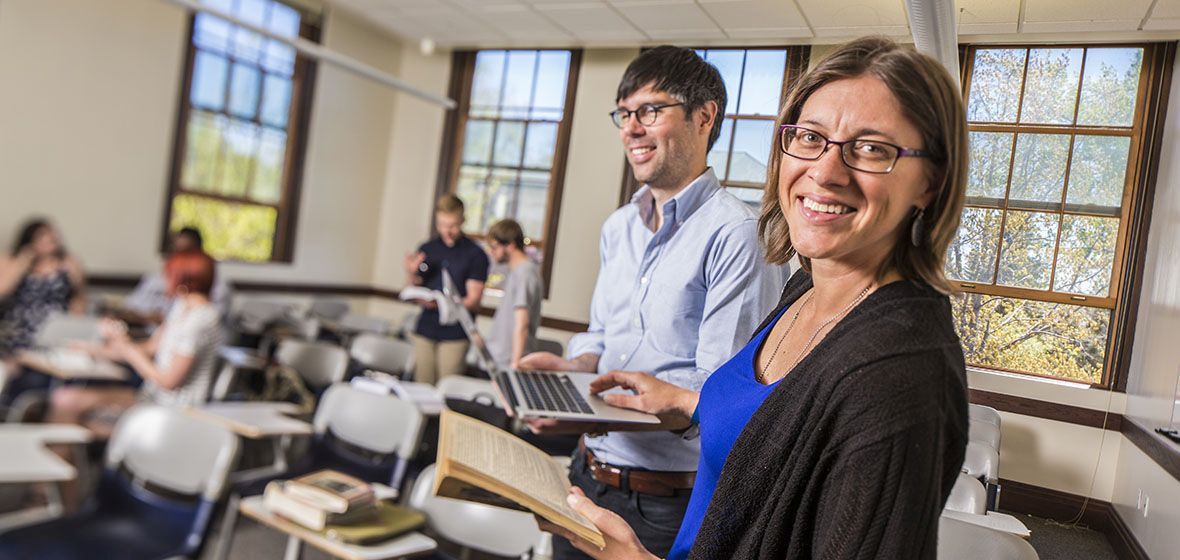Ashley Marshall is an associate professor in the University of Nevada, Reno's Department of English. Her passion for providing effective mentoring to new faculty members has led her to a position within the Faculty Senate's Early Career Academic Faculty committee. From past research to facing everyday obstacles, Marshall talks about her experience in the committee and how it's making an impact on academic success.
Q: What past experience do you have with research and creative work?
A: I am a scholar of eighteenth-century British literature and culture, and have published two monographs, twenty-plus articles, and an edited collection. My first book, The Practice of Satire in England, 1658-1770 (Johns Hopkins UP, 2013), is an attempt to rewrite the literary history of satire in what was arguably the greatest age of satire. My second book, Swift and History: Politics and the English Past (Cambridge UP, 2015), is devoted to the almost entirely ignored historical-political dimension of the work of Jonathan Swift, best known for Gulliver's Travels and A Modest Proposal. My work tends to be data-driven, dependent upon a lot of primary material, and it almost always concerns the intersections between culture and history/politics. I'm currently writing a book on the political journalism in London, 1695-1720, the period in which the first daily and tri-weekly newspapers began to appear. The combination of the daily politicization of consciousness and unprecedentedly frequent elections meant a significant transformation in the notion of public political engagement, and that shift is one important subject of my current project. In addition to doing my own research, I serve in the profession in a number of ways-including as the book review editor for the journal Eighteenth-Century Life -- and of course I mentor graduate students who are trying to launch their own research careers.
Q: What sparked your interest with the early-career academic faculty?
Last year, I was on the Faculty Senate Executive Board, and while working on committee formation at the beginning of the academic year, we began to realize what little we seemed to have to do with (and what little we seemed to be doing for) early career academic faculty. We recognized that we've never needed to think more about early career mentoring than we do right now, as the University is hiring a prodigious number of fantastic new faculty whom we want to help succeed. The more we talked about it, the more excited I became, the more excited we all became: we all realized the importance of promoting success among early career faculty. My interests, though, probably began at a more local level. My department (English) does an excellent job of mentoring new faculty, and as a beneficiary of such mentoring I've felt increasingly committed to finding ways to provide effective mentoring to our new faculty members.
We've just had our first Lightning Talks ("Meet Future Collaborators") event, featuring five-minute presentations from eight early career faculty from across campus. We'll be holding another of those events -- with snacks! please come! -- in the spring. In the spring, we will also be doing our second "Early Career Conversations," loosely modeled on the university-wide Campus Conversations. Last year, the focus was "Surviving the Tenure Process." While we haven't decided yet what this year's Conversation will be about, we've talked about addressing the process of moving from associate professor to full. The Early Career Academic Faculty committee shares the administration's eagerness to talk more with associate professors about how to maintain the momentum that will help them achieve the next promotion-not always easy in light of increasingly burdensome service responsibilities. We also want to make sure that new assistant professors are looking ahead as well, not only to but also beyond tenure. In addition to these specific events, the committee will also be exploring possibilities to improve a sense of community among early career faculty on campus, as well as looking at the mentoring programs currently in place and considering possible ways to improve upon and enrich those programs.
Q: What issues or obstacles do early academic faculty face?
A: Adjusting to a new university and a new department can be tricky, especially if you're fresh out of graduate school and either learning to teach or learning to teach a bigger load. Though most departments protect their untenured faculty from service, insofar as possible, inevitably one finds oneself dealing with committees and other service obligations, often for the first time. And of course the big issue is tenure -- not just doing what you need to do to achieve it, but also trying to understand what's expected. I know that many of my colleagues here are very concerned about that last question, and also that the administration is working hard -- as is the Faculty Senate -- to do their part to clarify and demystify the process. Another crucial issue for early career faculty has to do with balance: how much service to do, how long to spend grading papers, how many events to attend, how to navigate the transition from grad student to faculty member, and so on. There's no one right answer to any of those questions, but there is a lot of good advice to be had. I've always tried to talk to people I trust, preferably people who seem to be (a) happy, (b) productive/efficient, and (c) respected citizens of a department/college. And then there's Samuel Beckett, whose wisdom has always helped me: "Try. Fail. Try again. Fail better."












